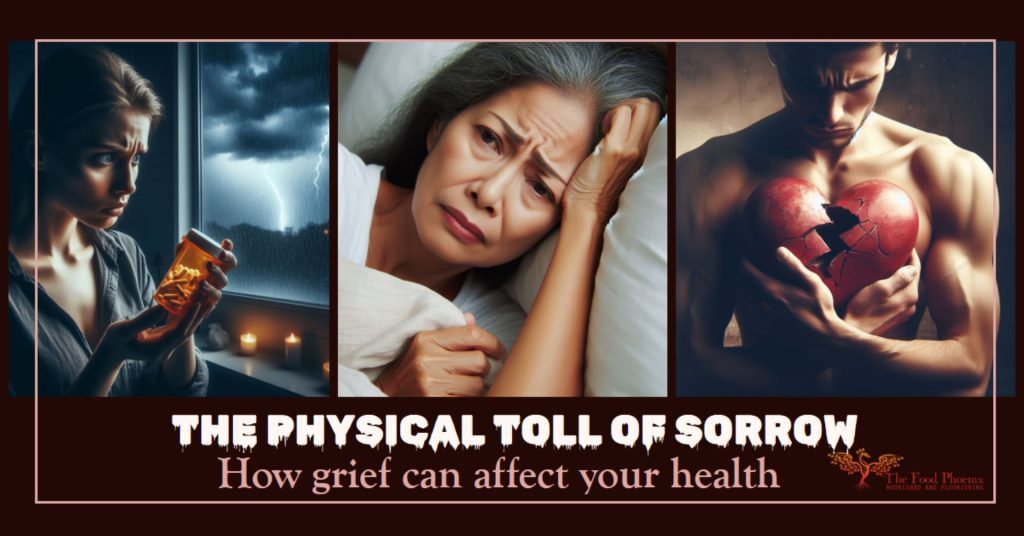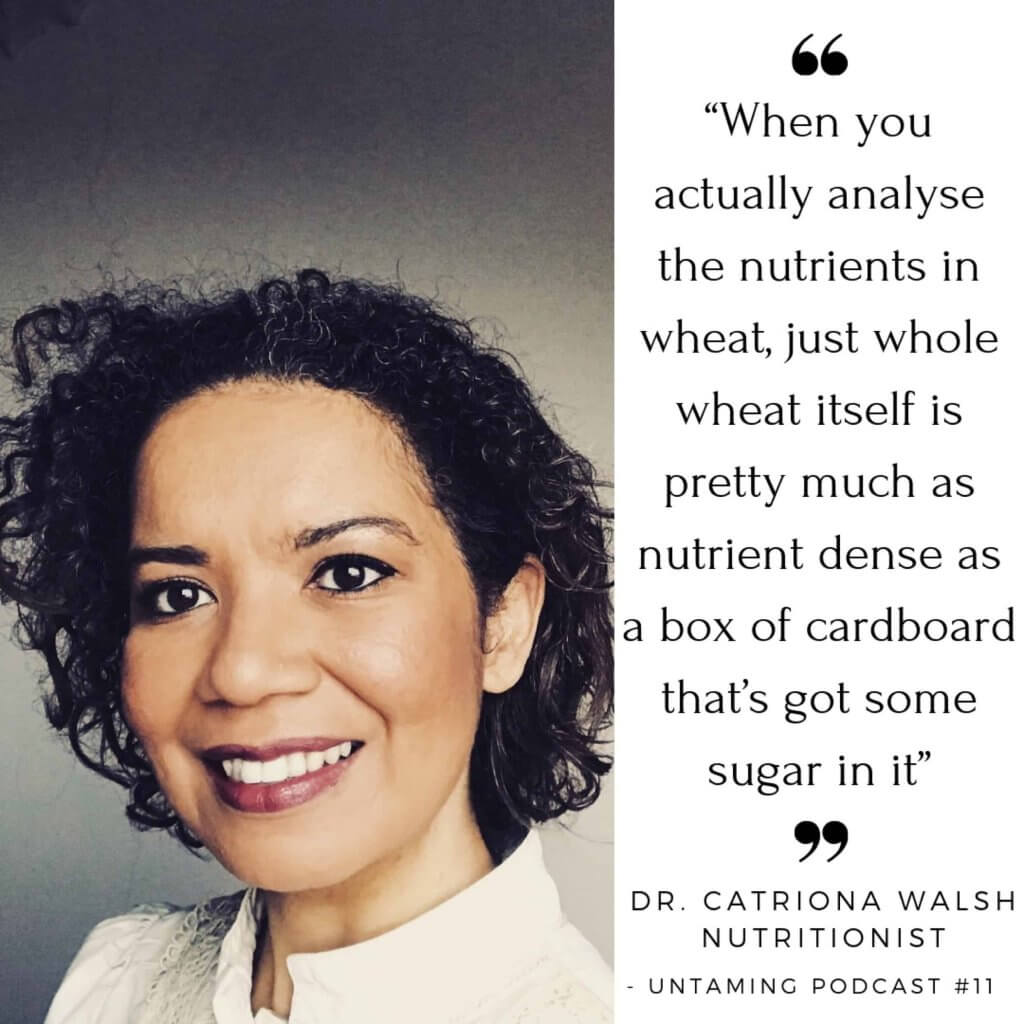Grief is a natural human emotion that occurs when we experience a significant loss. It can be the loss of a loved one, a job, a home, or even a pet. However, in this series of blog posts, I’ve chosen to focus on the grief we feel when we lose our health. While grief is a normal and healthy response to loss, it can sometimes lead to physical and emotional health problems.
Have you ever experienced a sudden or unexpected decline in health due to a medical or dental treatment, a procedure gone wrong, or other natural or manmade toxic insults? Medically-induced harm is known as an iatrogenic injury, and it can be a devastating and traumatic experience. It’s something that I and too many of my clients who’ve suffered from gadolinium poisoning have endured. In addition to the physical pain and disability that can result from an iatrogenic injury, many people also experience intense emotional pain and grief over the loss of their health and well-being.
This grief can manifest in many different ways, including deep sadness, anger, frustration, and anxiety. It can also have a profound impact on our physical health, leading to a range of symptoms such as fatigue, insomnia, headaches, and gut problems. In this article, we’ll explore the physical symptoms of grief in the context of lost health. And although we’ll focus on the misery caused by iatrogenic injury, the principles remain true for all sources of mental suffering. I’ll offer tips for managing these symptoms and coping with the emotional pain of this type of loss. Whether you’re dealing with the aftermath of an iatrogenic injury or struggling with chronic illness, it’s important to recognise the impact of grief on your physical and emotional well-being and to seek support and self-care strategies to promote healing and recovery.
When Illness Becomes a Way of Life: How to Deal with Grief and Loss
In the last post, I divulged how losing your health can be an underrated cause of grief. I also discussed how medications and medical injuries can be one of the root causes of a decline in your health. Then, I described many emotions you can experience due to the grieving process. Finally, I explained how grief can impact your quality of life and those around you. For this post, I’d like to address the question, “Can grief make you physically sick?” To do this, we’ll explore how grief can affect your health.
From Broken Hearts to Broken Bodies: The True Effects of Grief on Your Well-Being
Losing your health is one of the most challenging experiences a person can go through. Grief is a natural and necessary response to this loss, but it can also have a profound impact on our physical health. When we experience grief, our bodies go through a range of physiological changes that can manifest as physical symptoms. These symptoms can vary widely from person to person, and they may be mild or severe, short-lived or long-lasting. Some people may experience physical symptoms even if they don’t feel particularly emotional, while others may feel overwhelmed by both physical and emotional pain.
It’s crucial to recognise that grief is a complex and individual process, and there’s no one “right” way to grieve. However, understanding the physical effects of grief can help us take better care of ourselves during this difficult time. By identifying the signs and symptoms of grief-related physical distress and understanding what drives them, we can take steps to manage our physical health and support our overall well-being. In this article, we’ll explore some of grief’s most common physical effects and offer tips for taking care of yourself during this difficult time.

Before we can understand the effects of mental anguish and how grief can make you sick, we must first consider the effects of stress. Stress has its own ramifications on your metabolism and nutrition. It doesn’t matter whether the source of the stress is emotional, psychological, spiritual or physical; it will always place extra demands on your body. So, if you’re wondering can grief make you sick, the answer is yes. Grief can make you physically ill. So, let’s talk about how grief can affect your health. When we experience an ordeal, our bodies go through a range of physiological changes that can manifest as physical symptoms. These symptoms can vary widely from person to person, but they can include the following:
- Fatigue and exhaustion
- Insomnia or oversleeping
- Changes in appetite and weight (either loss or gain)
- Headaches and migraines
- Muscle tension and pain
- Digestive problems, such as nausea, vomiting, abdominal pain, reflux, bloating, diarrhoea, or constipation
- Weakened immune system, leading to increased susceptibility to infections
- Rapid heartbeat or palpitations
- Shortness of breath or difficulty breathing
- Chest pain or tightness
- Dizziness or lightheadedness
- Increased sensitivity to noise and other sensory stimuli
- Changes in sexual desire or function
- Increased risk of substance abuse or addiction
- Skin problems, such as rashes, hives, or acne
- Hair loss or thinning
- Changes in menstrual cycle or fertility
- Memory and concentration problems
- Increased risk of accidents or injuries
- Broken heart syndrome (a temporary heart condition that can be triggered by emotional stress)
How can grief affect people?
When you look at this long list of ailments, you may be wondering whether the illness is causing your sickness or whether you’re feeling sick with grief and how you can tell the difference.
In a vicious cycle, grief can impact your physical health and vice versa.
The way that grief and physical illness magnify each other can create a situation that can become more and more challenging to recover from the longer you’re down in that hole.
It can be challenging to try to work out which of your physical and even mental symptoms are caused by your illness and which are caused by the grieving process and your responses to it all.
Perhaps the source of your physical deterioration is academic, and you don’t always need to thoroughly dissect which symptoms are caused by grief and which by other more physical triggers to start to recover. Because the good news is that many of the same holistic approaches work to improve both your physical and mental health and make you more resilient to how grief can affect your health.
However, the chances are that if you approach your doctor with your concerns and symptoms, it’s likely they’ll prescribe antidepressants and other toxic and addictive psychotropics.
And what’s worse is that if you share your fears that your health challenges are a result of a medication or procedure like a gadolinium MRI contrast, there’s a real chance they’ll label you as suffering from a “functional neurological disorder.” That diagnosis can stalk you for years and lead health professionals to take your symptoms less seriously. Many people feel that this response is an example of medical gaslighting and a defence mechanism some doctors use to deflect from responsibility for causing their patient’s health to deteriorate.
It’s important to note that everyone’s experience of grief is different, and not everyone will feel sick with grief. If you or someone you know is experiencing severe physical symptoms after a loss, it’s paramount to seek support. Even though the grieving process is a very personal one, grief can feel very isolating, which can make things worse. Reach out if you’re struggling.
The following section is a deep dive into how grief can make you sick. It’s not essential reading, but you’ll love it if you’re a science nerd. However, if you hate science, you’re not interested in the physiological and biochemical ways sorrow can affect your health, and you’ve never been interested in how can grief make you feel sick, you can skip to the next segment, where I start to discuss ways you can protect yourself from the worst effects of grief on your body by clicking the button below.

How can grief make you physically ill?
Now that we’ve talked a bit about why losing your health can lead to grief and what symptoms you might develop as a result, let’s turn our attention to how grief can affect your health.
The first way that stress can impact your health occurs because, during the stress response, you produce higher levels of neurotransmitters and hormones called monoamines. The monoamines include catecholamines and indolamines. You’ll be familiar with the names of many monoamines because they include:
- adrenaline (epinephrine),
- noradrenaline (norepinephrine),
- serotonin,
- dopamine,
- melatonin,
- tyramine, and
- tryptamine.
When stressed, you release stress neurotransmitters like adrenaline, noradrenaline, dopamine and serotonin from your adrenal glands and nervous system as part of the fight, flight, freeze, fawn, and flop response. They work their magic and induce cascades of biochemical changes that trigger you to protect yourself. It goes without saying that grief is one of the cardinal forms of stress.
But once these neurotransmitters have done their job, what happens to them?
First, they need to be broken down so you can start winding down and relaxing again. One of the classes of enzymes that break down these monoamine neurotransmitters is unimaginatively called monoamine oxidase (MAO). MAO comes in two different flavours (MAO-A and MAO-B), but they work similarly.
I’ve mentioned MAO enzymes before in this article about body odour (of all things). The link between body odour and grief may appear tenuous at first glance. However, the chemicals that your body releases under the influence of fear and stress can give you (and anyone else within sniffing distance) an indication of how stressed you are and your antioxidant status.
In case you’ve forgotten, MAO enzymes appear to be the top source of free radicals causing mitochondrial damage inside our cells. And that’s because when they break down monoamines, MAO creates toxic compounds that your body needs to detoxify and eliminate. These toxic compounds are:
- hydrogen peroxide (H2O2 – a type of bleaching agent),
- ammonia, and
- aldehydes (pongy toxins and producers of free radical damage).
The Impact of Grief on Your Physical Health: Understanding Monoamine Oxidase and its Effects
How grief can affect your health
Mitochondrial damage is a foundational component of metabolic syndrome and is at the heart of chronic illness and degenerative conditions. This includes the damage accrued by heavy metals and other toxins. We’re designed to cope with a certain amount of oxidative stress in our mitochondria – this is the Goldilocks zone where it’s neither too much nor too little. This hormesis is a Nietzschean adaptive response where “what doesn’t kill me makes me stronger.” So with manageable amounts of free radicals inside our cells, we respond by increasing the antioxidants we produce. And that creates fitter and healthier cells.
However, excessive amounts of oxidative stress can overwhelm our ability to quench free radicals (often reactive oxygen species or ROS for short. But they can also be reactive nitrogen species). Excess free radicals start damaging the proteins, enzymes, membranes, and DNA inside our cells and mitochondria when this happens. Moreover, the free radicals can even amplify the damage they cause by creating a cascade of events with more toxic free radicals produced at each step.
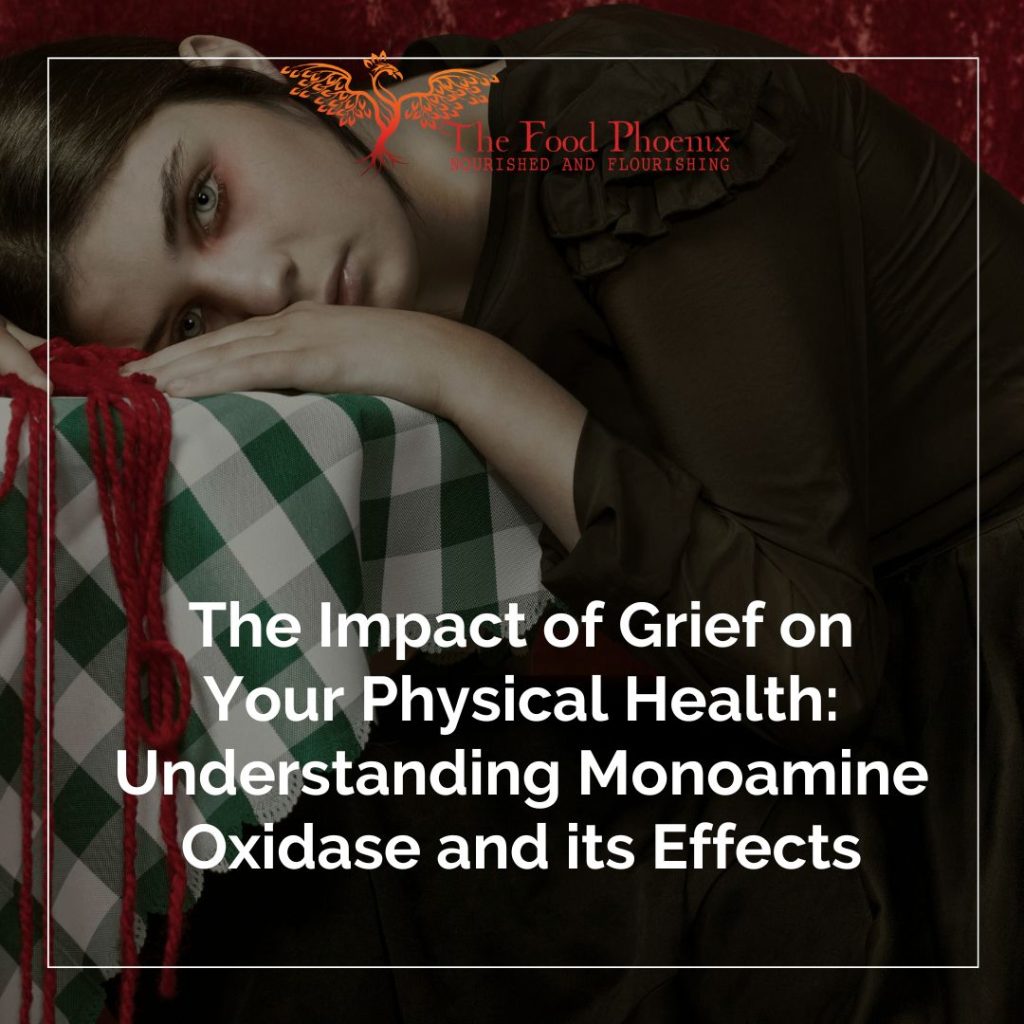
These additional free radicals can produce advanced glycation end products (AGEs) like glycated haemoglobin (HbA1c) and pentosidine. They can also produce lipid peroxidation products like malondialdehyde. If you have been diagnosed with diabetes or prediabetes, you should be tracking your HbA1c levels for an indication of how high your blood glucose levels are. HbA1c levels above the optimal range indicate you have excessive free radical production combined with inadequate antioxidants to defend against them.
So the first way that stress can be damaging is by creating toxins that poison your metabolism through the action of the MAO enzymes that we need to break down stress neurotransmitters. And this is one way you can end up literally feeling sick with grief.
How can grief make you physically sick? Understanding the Impact on Your Health
The second way the stress response caused by misery can hamper your health is by increasing your adrenal glands’ production of stress hormones like cortisol and other corticosteroids. Synthesising stress hormones is another immense drain on your nutrients. In particular, making and using stress hormones depletes your levels of coenzyme A. Coenzyme A is a nutrient that plays crucial roles in:
- energy balance,
- neurotransmitter production,
- blood clotting,
- your defence against oxidative stress, and
- making healthy cell membranes.
And you make coenzyme A from:
- vitamin B5 (pantothenic acid),
- the amino acid cysteine,
- magnesium, and
- ATP (our universal energy currency).
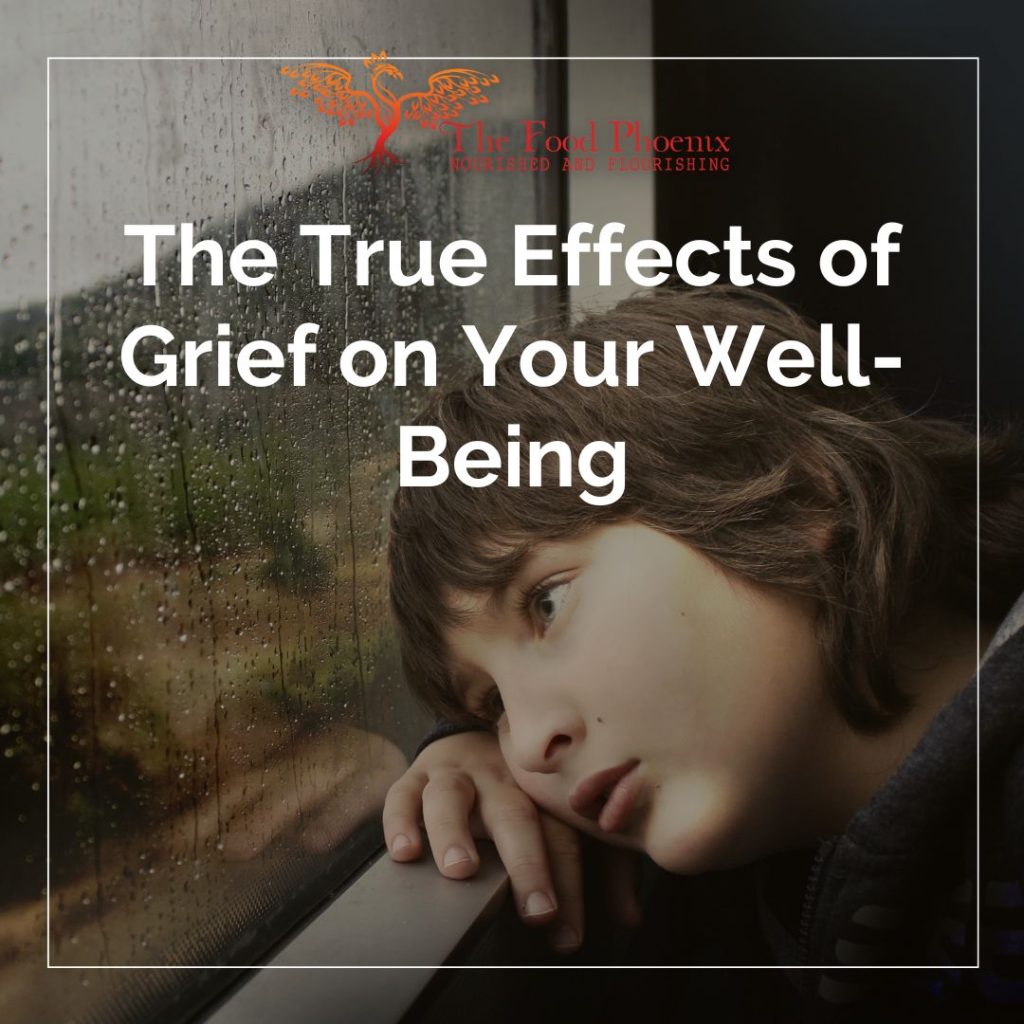
Since vitamin B5, cysteine, and magnesium are essential nutrients that we must replenish with our diets daily while ATP production decreases with mitochondrial dysfunction, it’s easy to see how prolonged stress can quickly exceed our ability to keep up with the body’s demands for these nutrients.
So driving up your production of steroid hormones made from cholesterol as part of the stress response can contribute to malnutrition, and this also helps to explain how grief can make you sick.
During stress, your adrenal glands and liver release large amounts of stored vitamin C (ascorbic acid) into your circulation under the influence of stress hormones. Ascorbic acid augments the stress response and protects your cells from the ravages of the extra waves of free radicals they create in response to stress hormones and monoamines. However, unlike most other animals, humans cannot synthesise our own vitamin C but must get it from our diets. So in a prolonged stress response, you can see how you could rapidly deplete your vitamin C levels. In fact, this acute scurvy plays a role in your susceptibility to sepsis and other infections when you’re run down and exhausted.
The stress response that sends us into sympathetic overdrive also impairs our digestion by directing our blood supply and energy away from our guts. As a result, stress:
- suppresses our production of stomach acid, digestive enzymes and bile,
- slows gut transit, and
- creates an environment in our intestines that is more hospitable to overgrowths of microbes in the wrong place (like small intestinal bacterial overgrowth) and the overgrowth of pathogenic microbes at the expense of friendly bacteria.
How can grief make you physically sick? The effects on nutrition
Grief Can Result in Malnutrition and Hinder Your Health
All this happens while impairing our ability to fight infections and manage the milieu of the microbes we host in our gastrointestinal tracts. At the same time, the foods we often crave while stressed tend to be ultraprocessed, high in food additives, carbohydrates and rancid vegetable oils, and low in complete proteins, vitamins and minerals. So it’s easy to see how we can develop malnutrition when stressed.
Driving up your production of steroid hormones made from cholesterol as part of the stress response can contribute to malnutrition, and this also helps to explain how grief can make you sick.
The emotional toll of grief can often lead to a lack of appetite, neglecting meals or not having the energy to prepare food, resulting in malnutrition. This can further exacerbate the physical symptoms of grief, such as fatigue and weakness. So it’s easy to see how we can develop malnutrition when stressed.
When we become more malnourished, our metabolism becomes even more impaired. And with deficiencies of nutrients, including B vitamins like thiamine (vitamin B1) and pyridoxal-5-phosphate (vitamin B6), we can start to produce excessive levels of metabolic toxins like oxalates. Oxalates also block vitamin B7 (biotin) and prevent biotin-dependent enzymes from functioning adequately. So our elimination of oxalates and other toxins (even normal byproducts of our metabolism) can be reduced by malnutrition through various means.
Oxalate elimination (or oxalate dumping) relies heavily on making and using sulphates properly because oxalates leave cells through sulphate channels (a type of solute channel) by exchanging with sulphate. But our sulphate production relies on adequate amounts of vitamin B6 (hopefully, you’ll remember that vitamin B6 is one of the nutrients that causes increased oxalate synthesis when it’s deficient).
To make sulphates, we also need adequate cysteine (the same amino acid we use to make coenzyme A and glutathione, our “master antioxidant”), and cysteine is already in short supply because of all the other vital roles it plays in our bodies. And we also need molybdenum as part of the transsulfuration pathway for synthesising sulphates. But unfortunately, it can be challenging to get sufficient molybdenum in your diet.
Oxalates will accumulate if you’re not eliminating them quickly enough from your body. The greater your body burden of oxalates, the worse you’ll feel.
Meanwhile, many other toxicants rely on the three phases of detoxification to exit your body. And each of these phases uses nutrients to function. Ergo, malnutrition will hamper your elimination pathways.
Again, if you’re not eliminating a toxicant, it will find somewhere in your body to make itself at home. As you read this, you may be thinking that if toxicants were people, they’d raise a couple of kids and get a dog after moving in. If only toxicants were so neighbourly. Toxicants will more likely trash your home (body), set fire to your possessions (tissues), and then try to extort all your money (ATP energy).
In summary, contributing to malnutrition is one of the ways grief can affect people’s health.
Can grief make you physically sick? The Physical Toll of Grief on the Body
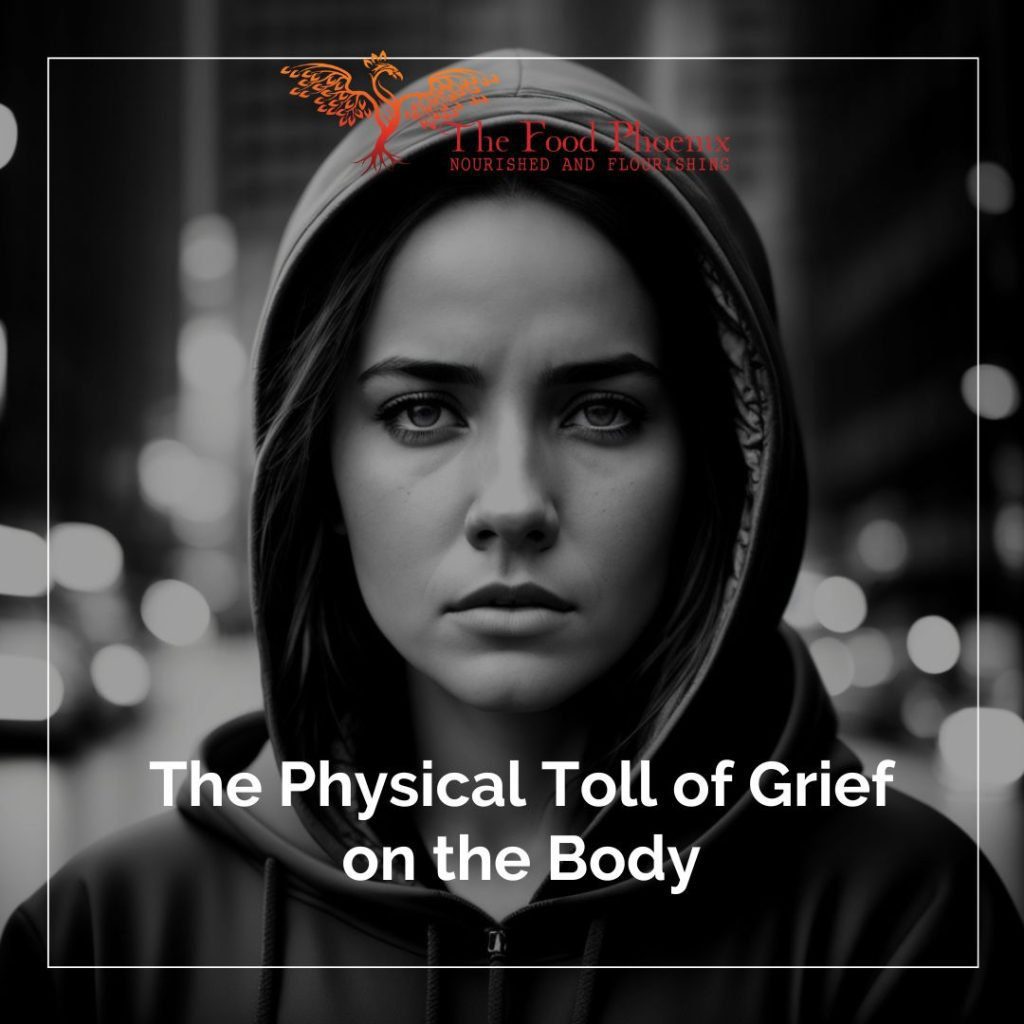
Excessively high or prolonged levels of circulating stress hormones like cortisol can also lead to:
- insulin resistance,
- high blood sugar levels,
- high blood lipids, and
- even more free radical damage from mismanaging calcium inside our cells.
Steroids like cortisol can also suppress your immune system in other ways. For example, have you ever picked up a cold, reactivated a cold sore, or ended up with shingles following a particularly stressful period? The immunosuppressive effects of high stress hormones also contributed to your vulnerability to infection.
In addition, mitochondrial damage, which releases fragments of dead and dying mitochondria from within our cells into your bloodstream, can also stimulate your immune response and cause chronic inflammation. To your immune system, your mitochondrial DNA resemble bacterial DNA rather than human genes, and mitochondrial proteins appear equally suspicious. These are called damage-associated molecular patterns (DAMPs) and can trigger inflammatory pathways that can damage your tissues, including your heart. Of course, combatting the flames of inflammation requires large amounts of antioxidant nutrients like:
- vitamin C,
- B vitamins,
- glutathione,
- zinc,
- coenzyme Q10,
- selenium, and
- vitamin D.
Ironically, these are the nutrients that are depleted by remaining in sympathetic overdrive for too long – one of the principal underlying reasons for chronic inflammation in the first place.
Can Heartbreak Really Make You Physically Sick? Science Says Yes
The cumulative effect of being bombarded with many different stressors alongside suboptimal physiological responses, perhaps because you also suffer from sleep deprivation, toxicity, and malnutrition, can make your health spiral down. This is called allostatic overload. And allostatic overload can predispose you to develop broken heart syndrome. Broken heart syndrome is also called stress cardiomyopathy or Takotsubo cardiomyopathy. Thankfully, this is a rare type of heart damage, but it’s still life-changing. Broken heart syndrome tends to affect older people, especially women over 50, under extreme stress, such as after losing their spouse.
People with Takotsubo cardiomyopathy also have changes in their brain structures. Some parts of their brains appear shrunken on MRI imaging, while others are enlarged. And the neurones within several regions of their brains show unusual connectivity. The portions of the brain that are demonstrated to have the most noticeable changes are those involved with:
- language,
- emotion,
- reasoning,
- perception, and
- autonomic control (over functions like heart rate, blood pressure, and temperature regulation).
Grief really can have devastating effects.
Your nutrient status becomes even more critical when you're under stress
Nutrition plays a mammoth role in your resilience to free radical damage because food (and supplements) are the source of the antioxidants our cells produce. And if you look at it from another perspective, the greater the stress you’re exposed to, the more your antioxidant nutrients are depleted, and the greater your need for better nutrition to counterbalance this. I’ve discussed which are the most nutrient-dense foods that are loaded with antioxidants here and here. But, unfortunately, they’re not what I was taught in medical school, and they’re probably not what you learned, either.

How does grief make you feel sick? When the cure is worse than the disease
Prefer not to suffer from medication side effects? Me neither
Even if you’re intuitive, collating new symptoms you develop with medication side effects can take a while. And then, when you realise that the medications you’re taking create imbalances inside your body, it doesn’t take long to decide you’d like to be on as few medications as possible – preferably none. But then, how will you control your symptoms?
How grief can be a barrier to making changes that would help you to feel better and improve your health
Many people turn to supplements and make diet and lifestyle changes. This is the path I chose because it’s incredibly effective. But unfortunately, changing your diet and lifestyle usually means sacrificing even more when you’ve already lost so much. Add to this the fact that comfort foods can act as an emotional crutch to help you to face the worst days. Yet these foods are usually some of the least healthy and the most likely to add to your burden of unpleasant symptoms. Plus, they can be addictive and getting off some of them can cause withdrawal symptoms.
On the other hand, when you get overburdened with stress, instead of overeating, you might lose your appetite completely. And it can seem like too much of a hassle to prepare food, particularly if you live alone. In these circumstances, you can start wasting away and quickly become more malnourished.
Can grief make you physically ill, and what should you do about it?
Meanwhile, some beneficial lifestyle changes may seem unappealing and can be time-consuming. And diet and lifestyle changes tend to be something that you need to be consistent in. It can be hard to predict how long you’ll need to stick with making each of those changes to be guaranteed a better quality of life. For many things, the changes will need to be lifelong.
It’s essential to prioritise proper nutrition and make an effort to eat nutrient-dense foods that support your immune system and overall well-being. Seeking support from a nutritionist can help you develop an appropriate meal plan that meets your nutritional needs while dealing with grief.

In addition to looking at your diet, you should focus on getting enough sleep, moving and exercising regularly, getting outside into nature (“awe walks” can be a super way to do this), and seeking support from friends, family, or a mental health professional.
You may also find it helpful to practice relaxation techniques like meditation or deep breathing. Engaging your creative brain through art, writing, singing, music, knitting, and crafting can be yet another therapeutic way to work through grief, stress, trauma, and illness.
How does grief affect a person? The importance of recognising the mind-body connection
Grief is a natural and healthy response to loss, but it can sometimes lead to physical and emotional health problems. By understanding how grief affects your body and mind, you can take steps to care for yourself during this difficult time. Remember to seek support when needed, and be patient and kind to yourself as you work through your grief. If you’d like to speak with me to clarify whether dietary changes can help you regain your health and make you more resilient to grief, please set up a free clarity call here.
While focusing on healthy eating habits during the grieving process may be challenging, taking care of yourself is crucial for your mental and physical health. Remember that self-care is not selfish and that taking care of yourself is one of the best things you can do for your loved ones who are also going through their own grieving process.
Transform Your Life with Self-Care: Effortless Techniques to Boost Resilience and Overcome Grief-Induced Stress
I hope this has answered the question, “Can grief make you physically sick?” As we’ve seen, grief can take a heavy toll on both your physical and mental health. If you’re struggling with the loss of health, your present life, or future dreams, it’s essential to prioritise self-care to improve your resilience to stress and grief.
That’s why I’m excited to offer you my FREE guide: “Feel Better with Quick and Easy Self-Care Activities.” This guide is packed with 67 simple self-care activities to help you cope without feeling even more overwhelmed.
You deserve to take care of yourself, even when you feel like you don’t have the time or energy. Get relief from grief and stress with these self-care techniques. All you have to do is sign up for The Food Phoenix newsletter today to receive a download link for mini self-care routines that fit into your busy schedule. Say hello to balance and goodbye to exhaustion.

